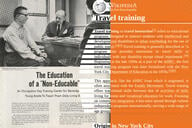You have /5 articles left.
Sign up for a free account or log in.
For about 24 hours last week, confusion about a professional association’s quirky arrangement with ProQuest became a flash point in the debate about ownership of digital content.
On Wednesday, academics raged against ProQuest on social media after the Renaissance Society of America said the company would cancel the organization's subscription to Early English Books Online, an essential database of early English printed works. Then on Thursday, rage turned to relief after ProQuest said RSA members will continue to be able to access the database, known as EEBO.
With the controversy now dying down, some academics say the incident should serve as a “wake-up call” to higher education about who controls access to resources crucial to teaching and research. Meanwhile, the RSA is working to prevent it from happening again.
“There is literally no reason for these centuries-old books to be the monopoly of a commercial publisher who owns not a single one of them,” John Overholt, a curator at Harvard University’s Houghton Library, wrote in a blog post. “These books are part of our cultural heritage, and it’s high time we made them available to everyone.”
The RSA, a professional association for Renaissance and Early Modern-period scholars, has at least been trying to do so for its members. Normally, university libraries subscribe to databases such as EEBO, but many institutions -- especially those with smaller library acquisition budgets -- are not able to afford it.
In 2013, the RSA “went out on a limb” to address that issue, becoming the first and only professional society to purchase a subscription to EEBO, former director Ann E. Moyer said in an interview. Since then, the database has been an added bonus of RSA membership, accessible through the organization’s website.
“It’s a pretty big issue in terms of digital access,” Moyer, associate professor of history at the University of Pennsylvania, said. “A number of societies have been watching this to see if it would be a viable way to get database access out to people who can’t get it through their institution.”
On Wednesday, three days before the subscription was set to expire, the RSA abruptly announced that it would no longer provide access to EEBO -- but not because researchers weren’t taking advantage of the deal. If anything, it had proved too popular.
“The basis for the cancellation is that our members make such heavy use of the subscription, this is reducing ProQuest's potential revenue from library-based subscriptions,” the RSA said in its initial announcement, based on communications it had with the company.
The news kicked off what some academics on Twitter called either #ProQuestGate or #EEBOgate, with scholars calling on ProQuest to “#FrEEBO.” Some hastily stitched together patchworks of other catalogs, databases and resources to benefit those who would be losing access. Others agonized over imagining life and work without the database.
“Access to EEBO through membership in RSA is crucial to scholars who work at institutions without EEBO subscriptions,” Overholt wrote. “Without these books they can’t do their research. Without that research, they can’t get tenure.”
ProQuest apologized for the “confusion” on Thursday afternoon, saying in a statement that EEBO access would not expire on Oct. 31.
“There was some confusion on both sides, and we just needed a quick phone call to clear it up,” a ProQuest spokesperson said in an email.
The deal was in danger of ending as recently as last year, Moyer said. Toward the end of the first one-year subscription, she said, ProQuest was “pretty concerned … but nonetheless let [the RSA] renew for a second year.” Moyer said she was not familiar with this year’s negotiations.
To prevent a similar situation next year, the RSA is entering a long-term deal with ProQuest, Executive Director Carla Zecher said in an email. “The RSA and ProQuest have agreed not just to renew our partnership, but effectively to build a new one,” she wrote.
The new partnership is likely to go beyond access to EEBO, though Zecher, director of the Center for Renaissance Studies at the Newberry Library in Chicago, said she could not yet give any specifics. ProQuest and RSA will continue to negotiate over the next few weeks. “And we are exploring other ways to collaborate, as well,” she wrote.
Despite those unsettled aspects of the deal, Zecher added, “In terms of the details of RSA members' access to the EEBO database, it will be exactly as before.”




